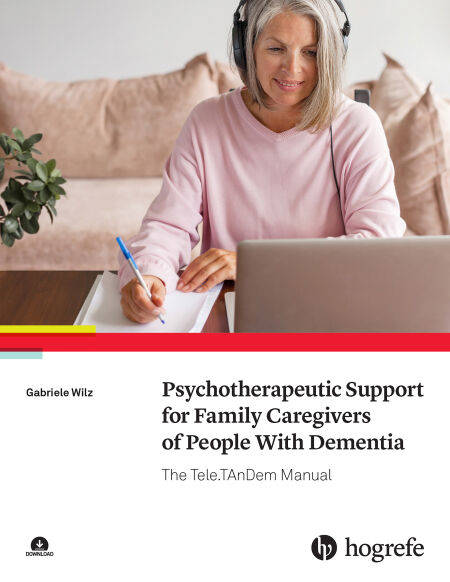
Bedankt voor het vertrouwen het afgelopen jaar! Om jou te bedanken bieden we GRATIS verzending (in België) aan op alles gedurende de hele maand januari.
- Afhalen na 1 uur in een winkel met voorraad
- In januari gratis thuislevering in België
- Ruim aanbod met 7 miljoen producten
Bedankt voor het vertrouwen het afgelopen jaar! Om jou te bedanken bieden we GRATIS verzending (in België) aan op alles gedurende de hele maand januari.
- Afhalen na 1 uur in een winkel met voorraad
- In januari gratis thuislevering in België
- Ruim aanbod met 7 miljoen producten
Zoeken
Psychotherapeutic Support for Family Caregivers of People With Dementia E-BOOK
The Tele.TAnDem Manual
Gabriele Wilz
E-book | Engels
€ 42,99
+ 42 punten
Omschrijving
Learn how family caregivers of people with dementia can be supported by psychotherapy
Provides step-by-step guidance for face-to-face or remote therapy
Illustrated with therapeutic dialogs from real cases
Includes downloadable intervention handouts
This handbook addresses the extremely challenging situation that family caregivers of people with dementia face and is informed by the use of evidence-based psychotherapeutic strategies to support them.
The book guides readers step-by step through effective therapeutic strategies, mainly based on cognitive-behavioral therapy, and illustrated with excerpts of dialogs between therapists and family caregivers from real sessions. Different modules address topics such as dealing with challenging behavior, self-care, perfectionism and guilt, as well as changes in the relationship with the ill person, barriers to seeking social and professional support, stress management and emotion regulation, accepting one's own limits, and dealing with institutionalization. These modules can be put together to meet different individuals' needs. Particular emphasis is placed on creating a positive therapeutic alliance, resource activation, and helping caregivers develop the motivation for change. Finally, multiple handouts that can be used in clinical practice are available for download.
The intervention is suitable for various settings, including face-to-face therapy or remote forms such as telephone or online therapy. This manual is ideal for clinical psychologists, gerontologists, psychotherapists, social workers, and counsellors working with people with dementia and their families.
Provides step-by-step guidance for face-to-face or remote therapy
Illustrated with therapeutic dialogs from real cases
Includes downloadable intervention handouts
This handbook addresses the extremely challenging situation that family caregivers of people with dementia face and is informed by the use of evidence-based psychotherapeutic strategies to support them.
The book guides readers step-by step through effective therapeutic strategies, mainly based on cognitive-behavioral therapy, and illustrated with excerpts of dialogs between therapists and family caregivers from real sessions. Different modules address topics such as dealing with challenging behavior, self-care, perfectionism and guilt, as well as changes in the relationship with the ill person, barriers to seeking social and professional support, stress management and emotion regulation, accepting one's own limits, and dealing with institutionalization. These modules can be put together to meet different individuals' needs. Particular emphasis is placed on creating a positive therapeutic alliance, resource activation, and helping caregivers develop the motivation for change. Finally, multiple handouts that can be used in clinical practice are available for download.
The intervention is suitable for various settings, including face-to-face therapy or remote forms such as telephone or online therapy. This manual is ideal for clinical psychologists, gerontologists, psychotherapists, social workers, and counsellors working with people with dementia and their families.
Specificaties
Betrokkenen
- Auteur(s):
- Uitgeverij:
Inhoud
- Aantal bladzijden:
- 160
- Taal:
- Engels
Eigenschappen
- Productcode (EAN):
- 9781613346310
- Verschijningsdatum:
- 10/12/2023
- Uitvoering:
- E-book
- Beveiligd met:
- Digital watermarking
- Formaat:
- ePub

Alleen bij Standaard Boekhandel
+ 42 punten op je klantenkaart van Standaard Boekhandel
Beoordelingen
We publiceren alleen reviews die voldoen aan de voorwaarden voor reviews. Bekijk onze voorwaarden voor reviews.









